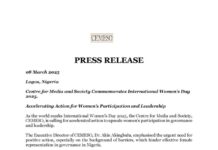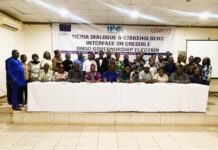After forming his cabinet, some six months after inauguration as the president in 2015, the charge, Muhammadu Buhari handed his ministers was for them to go and make impact in their respective sectors. But three and a half years down the line, it appears difficult to really pin-point achievements in some of these sectors.
Indeed, for the communications sector, headed by Adebayo Shittu, who assumed the position on November 11, 2015, his performance at the helm of affairs at the ministry, was greeted with mixed feelings, with the majority rating the ministry’s performance low. That is not to say the minister never worked! Of course, he did. He came out with several lofty plans targeted at moving the sector forward. Painfully, they largely ended up on paper. The Buhari-led administration changed the ministry from communications technology to the communications sector, a change that never went down well with stakeholders in the industry.
The focus of the ministry in the era of pioneer minister of Communications Technology, Dr. Omobola Johnson, was to create a knowledge-based economy, which has been the key element in ICT sector policy-making in the last 17 years. Successive governments have presided over varying degrees of growth in the sector to the point where ICT with a liberalised market policy, has produced the explosive but uneven growth in the sector thus far.

Shittu, a lawyer by profession, promised not to deviate from the sustainable development plans already playing in the sector. Though he clearly came up with ideas that could to a large extent re-position the ICT sector and move it forward, the plans were encumbered by both internal and external forces around him.
The minister, who claimed to have entered politics at the age of 26 in Ibadan, Oyo State, while unveiling the Federal Government’s roadmap for the sector on January 26, 2016, in Abuja, said the plan was to create a pathway for further development of the industry.
With the theme, “Continuing Innovation and Innovating Continuity: Creating a SMART Digital Nigeria,” the minister said this conceptual double helix is what he believed to be the cultural DNA needed to create a “SMART Digital Nigeria.”According to him, the sector’s focus had been on information technology infrastructure development, promotion of ICT local content, ICT deployment in government, extending access to Nigerians and providing an enabling environment for competitiveness in the industry.
The minister had said that the dominant issue for him was how to nurture the explosive growth of the industry to ensure that it reached every part of Nigeria both urban and rural.
Shittu planned to leverage the bountiful opportunities in the communications sector to generate additional revenue for the government, when the prices of oil have been on the rapid decline in the international market. He was to create employment for the teeming youths, improve access and enhance the quality of service delivery and affordability in the country.
The Communications Ministry, under Shittu, identified five steps to getting a SMART Digital Nigeria. These include building on ICT sector growth by improving infrastructure and quality of service; SMART Government to deliver ICT and broadband penetration (government, soft infrastructure, commerce, broadband penetration, and security); raising revenue and reducing waste; policy of innovative continuity for private sector-led continuous innovation; and the migration to a digitally-native Nigeria through capacity, job and wealth creation.
White elephant projects
To actualise a SMART Digital Nigeria, and indeed build capacities and creates jobs, the ministry came up with the idea of establishing ICT universities in some selected states across Nigeria.
Shittu had decried that graduates of computer science in the country lacked skills to fit into the ICT industry. He stressed that many of them were unemployable, “therefore a specialised ICT Academy would polish the graduates.” The idea of a specialised ICT varsity received condemnation on the ground that all Nigerian universities have computer science departments.
After several back-and-forths on the matter, both the Federal Executive Council and the National Assembly questioned the usefulness of the gigantic project that was expected to gulp billions of naira and subsequently, the idea was jettisoned.
In an interview with The Guardian, the Director-General, Delta State Innovation Hub (DSHuB), Dr. Chris Uwaje, listed as one of the lows of the ministry Shittu’s unsuccessful pursuit of an ICT university.

Furthermore, as part of funding the sector, the minister had on May 15, 2017, came up with plans by the ministry to establish an ICT Bank, which will be development-oriented that would assist in the financing of communication and ICT companies based in Nigeria.
Shittu believed the answer to the funding problem of Nigerian startups is an ICT Development Bank.
The minister said it would make commercial banks to be less interesting to tech entrepreneurs since the former are still reluctant to support startups with financing.
This culture with commercial banks, the minister said, is responsible for the delay or abandonment of great innovative ICT projects in Nigeria. “The ICT Development Bank reflects the Federal Government’s awareness of the inescapable nature of innovation in the growth of the ICT industry, on which part of the country’s growth will depend in the course of time. Only by supporting tech entrepreneurs will the country become a hub for ICT innovation, attract more investors, create more jobs and wealth,” the minister said.
But with new administration taking-off today, the floating of an ICT Development Bank failed to materialise under Shittu.
Earlier this year, precisely in January, the ministry also came up with the plan to build a National ICT Park in Abuja, which was expected to attract real investment opportunities for the country if properly harnessed.
Shittu, while defending the planned ICT Park, said it would be an avenue for the training of ICT talents in line with global digital transformation agenda, and would further facilitate digital capacity building for immediate employment, entrepreneurial skills development, job and wealth creation, designed to promote digital economy in an era of disruptive technology through effective regulations.
He, however, said the initiative would be supported by private investors, some of whom he said, had already indicated their interests to invest in the National ICT Park, which is expected to open up investment opportunities for the Nigerian economy.
Though the project appears attractive, industry stakeholders, are however pessimistic about its implementation. According to a telecoms expert, Kehinde Aluko, the financial support from the ministry is lacking, and the complexities that surround it are huge. Moreover, four months after that announcement, it remained on paper.
Local content drives battles acceptability challenge. Compared to the oil and gas sector, where the local content drive has been deepened, this remains a huge challenge for the ICT sector, even after several promises by this administration to drive the processOne sub-sector, this challenge continues to plague is software. Stakeholders had at a forum in Lagos, decried the huge losses Nigeria incurs yearly on foreign software. According to them, Nigeria spends over $400 million yearly on foreign software license renewal without recourse to indigenous software that could perform the same task. Uwaje, a former President of the Institute of Software Practitioners of Nigeria (ISPON), listed the lows of the ministry in the last four years to include the lack of foresight to recognise that the software ecosystem is the bedrock of ICT. The hardware sub-sector, which is seriously plagued by poor power supply, is still 70 per cent foreign dominated. Painfully, it was only recently, that the ministry just announced its readiness to partner with any group or stakeholder toward transforming the ICT local content for rapid development of the industry. Shittu reiterated the commitment of the ministry to initiatives that would attract local and international investments into the country, with a view to boosting development in the technology sector.
Digital exclusion still reigns
One of the cardinal selling points of the ministry under Shittu was to promote the country’s digital inclusion project. While appreciating the efforts of the minister in this line, the Chairman, Publicity, Events and Trade Services Committee, Nigeria Computer Society, Jide Awe, said despite the importance and volume of attention given to digital inclusion, large segments of the populace such as women, the elderly, individuals living with disabilities, people outside the formal sector, the poor and the rural populace are digitally excluded. Awe noted that the digital economy is definitely on the rise, greater digital adoption, growth from social and mobile channels and ICT is hugely important and contributing more than ever before. According to him, figures from NCC indicate growth in sector investment, stressing that impressive contributions from youth innovation, tech entrepreneurship and startups are some of the positives. “While the ministry did not initiate most of the outstanding initiatives, it has at the same time not constituted a stumbling block to these youth-led activities changing value chains and birthing new forms of value and opportunity,” he stated.
Telecoms services still not satisfactory, ubiquitous
Despite promises of improved telecoms services from both the regulator and operators, services offered to the over 174 million active subscribers in Nigeria remain unsatisfactory. From Lagos to Abuja, Ondo to Port Harcourt, Jos to Enugu, Borno to Sokoto, the quality of service, especially from the GSM operators, the quartet of MTN Nigeria, Globacom, Airtel, and 9Mobile leaves much to be desired. Checks by The Guardian confirmed the barrage of complaints by subscribers, who experienced increased dropped calls, aborted and undelivered short message services (SMS), and countless failed calls. Equally, Internet services have remained a challenge; just as much as uploading and downloading activities, all of which make 4G services nothing to write home about, despite promises from Smile, nTel, Swift, and others, which claimed superiority. Nigeria still has about 195 access gaps, which is an equivalent of about 40 million Nigerians without any form of telecoms services. This remains a blight on the Buhari-led administration.
What this administration could have done better. Awe said the minister could have engaged strategically beyond the sector and developed strategic collaborations with other vital ministries and agencies outside the ministry of communications; with ministries such as the Ministry of Education, Finance, Industry, Trade, and Investment as well as agencies such as CBN, NIMC. He stressed that the proposed ICT University needed buy-in from stakeholders as well as collaboration with key ministries. As part of the ICT Roadmap implementation, he said the ministry should have prioritised e-government and facilitated the digital transformation of government processes and services. In particular, the adoption of systematic tech-enabled approaches in vital sectors and big projects with massive spillover such as national e-voting would have boosted job creation and economic growth. According to him, more could have been done to address the effects of the harsh economic challenges and adverse business conditions hampering the sustainability of the industry. In addition to creative approaches, the political will was needed to empower the sector and foster inclusive digital transformation. He said: “I believe he has been approached and engaged in quite a few stakeholder events. As a minister, it is important that he made visible efforts to connect, learn and be inclusive. However, his communication on key priority issues should have been more intentional and unambiguous to ensure effective buy-in by the ICT sector and community; especially to give attention to the concerns of industry and the objectives of the government. “Developing an ICT Roadmap was a good step towards providing the sector with guidance and direction to ensure ICT becomes a viable foreign exchange earner. Though the implementation is ongoing, there should have been evaluation and monitoring of the plan by relevant stakeholders. There should also have been appropriate reviews and evaluation of other sector policies to ascertain the impact and effectiveness of such policies. To Uwaje, he regretted that the ministry failed to develop 10,000 skilled software practitioners and enthroned e-government mechanism to retool the civil service. Aluko said though ICT has had vital impact on GDP growth and service creation, public awareness of cyber threats is low and the level of cybersecurity needs to improve.
Some notable achievements
Despite all the identified gaps, some measures of achievements can still be linked to this administration and indeed the communication ministry. About a year into the life of this administration, Vice President, Prof. Yemi Osinbajo, had hinted of the plans the Federal Government to create millions of jobs through the establishment of technology hubs across the country. Indeed, though the plan started late, it recorded huge success as there were many establishments. The Guardian findings showed that there are now over 50 technology hubs in the country, up from seven about five years ago. Further checks revealed that South West houses over 15; South East has about four; South-South is home to eight, while Northern Nigeria can boast of 12 hubs. It has created hundreds of thousands of jobs. Also, the country’s broadband penetration drive also gained traction. The Nigerian Communications Commission (NCC) led by Prof. Umaru Danbatta, announced that the country surpassed the 30 percent target set for 2018. It is currently at 33 percent. Operators are already working towards a 70 percent penetration in another five years. In March, the Director-General, the National Information Technology Development Agency (NITDA), Dr. Isa Ali Pantami, disclosed that the Federal Government now saves N24.7 billion monthly, through the deployment of Information technology (IT). According to him, under the e-governance, many leakages in government institutions have been blocked by IT deployment and that has integrated even the revenue of the country. “With the implementation of Treasury Single Account (TSA) and Integrated Payroll and Personnel Information System (IPPIS) and BVN, the Federal Government of Nigeria has been saving a minimum of N24.7 billion monthly, just because of the implementation of this IT software. “In addition, look at the confidence of our citizens today it has improved significantly in Nigeria because many people today have trust in online banking,” Pantami said. From his perspective, the Chairman, Association of Licensed Telecoms Operators of Nigeria (ALTON), Gbenga Adebayo, this administration did quite well, in very many areas, and in particular, for the effort being made by the Presidential Business Enabling Council, which in no doubt has helped in FDI and has also seen many homegrown businesses developed and now doing very well. Adebayo said through the various government intervention projects, there are now many startups that are doing incredible things in new innovations, new knowledge and as well and job creation. The ALTON boss said: “We have also had a very stable regulatory and policy environment and this has helped in the rapid growth of ICT as an enabler of businesses and infrastructure. We, therefore, cannot but continue to support the government in their very many initiatives and to wish them many more milestones of successes in the second term.”
Going forward
Adebayo said it would be nice if the new administration would provide some palliative for the telecom operators, considering the high cost of service provision, low average revenue per user and all the challenges of our operating environment, in particular, the singular issue of multiple taxations, “this would have driven down the end user price.” For the new leadership of the industry, after May 29 inauguration, Adebayo, Uwaje and Awe urged the new administration to focus on employing an industry person, and with knowledge, history and challenges and above all a patriot of the sector. The ALTON boss said he hoped that a new minister would continue the good work done by the previous administration, stressing that consistency is important and continuity is critical to the sustainability of success. Uwaje said for Nigeria to strategically refocus her ICT mission, the followings are imperative: the creation of the Office of the CIO as ICT General of the Federation headed by an IT professional; establishment of a National Software Commission under the Presidency – with a National Software Board. From Awe’s view, the new minister should be enthusiastic about how the nation develops capacity and harnesses emerging technologies (AI, machine learning, the Internet of Things (IoT), blockchain, etc) to foster innovation and growth. According to him, the minister should be a facilitator of smart culture adoption and he/she should have the political will to prioritise the strategic digital agenda. Strategic commitment to local ICT development, expanding the digital economy, creating jobs locally, and seizing global opportunities are all critical.
















